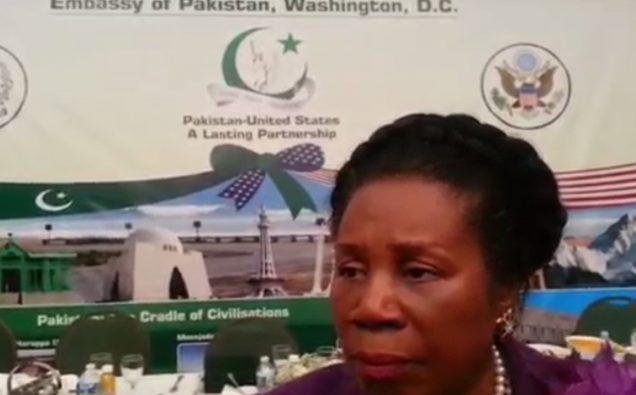
Congresswoman Sheila Jackson Lee has emphasized the importance of cooperative U.S.-Pakistan relations, arguing that the two countries should work together in the fight against terror and find ways to resolve problems.
The Democratic lawmaker from Houston saw a pathway for the two countries to continue their collaboration toward combating terrorism in the interest of both countries. When asked about reports suggesting a change in U.S approach to Pakistan including expansion of drone strikes against militant targets, the lawmaker Congress has not been briefed about any change in policy toward Pakistan.
“Secretary (of State) Tillerson is responsible for engaging with members of Congress. I have not had any direct statement from the State Department. I have to wait on that statement to determine whether there is a change in policy. The way we work, our three branches of Government, the Administration needs to advise the United States Congress on those changes,” she said at the Pakistani Embassy, where Ambassador Aizaz Chaudhry hosted an interfaith Iftar dinner, bringing together followers of major faiths.
The remarks by Lee, who is co-chair of the Pakistan Caucus on the Capitol Hill, came amidst reports that Washington is considering hardening its policy to make Pakistan go after the Afghan Taliban that allegedly operate out of sanctuaries in the South Asian country. The reports also suggest that the U.S. might expand drone operations to target militants that might be hiding in Pakistan.
The news stories regarding the Trump Administration’s contemplating a change in policy toward Pakistan coincide with the near completion of U.S. review of its Afghan war policy that is likely to result in sending thousands of additional troops to the landlocked country.
The United States, which has spent billions of dollars on improving conditions in Afghanistan since 2001, wants to stabilize the country before it scales down its military presence from the current 8400 troops. But analysts believe a range of problems including a lingering lack of governance, political infighting over power-sharing between President Ashraf Ghani and his political allies, ethnic rivalries, deterioration in Afghanistan-Pakistan relations, and interference by regional countries including Russia have heightened the country’s troubles.
Washington has also given Pakistan billions of dollars in assistance and strengthened its counterterrorism capacity but says the country has allowed the Haqqani network to operate on Pakistani soil and plan attacks in Afghanistan. Pakistan has denied such allegations, citing its operations against terrorists.
Islamabad says it has nothing to gain from fomenting troubles in Afghanistan and has been underscoring the need for resumption of a reconciliation process that brings together the U.S., China, Pakistan and Afghanistan and seeks to bring warring Taliban to the negotiating table.
Speaking to reporters at the Pakistani embassy in Washington, Lees noted that Washington and Islamabad have a “pathway of cooperation” and felt that the two longtime allies should seek to resolve any differences that arise in the relationship.
“We are always discussing working with Pakistan on the issue of terrorism, both against the Pakistani people and certainly surrounding nations.
“I believe we have a pathway of collaboration. We are a people that love democracy, and we should continue on that pathway. As chairwoman of the Pakistan Caucus in the United States Congress, we are always keen to make sure that we find ways to solve problems, when problems arise, and to work together.”
Pakistan has rejected Kabul’s assertions that the Taliban insurgency – which has seen the Afghan government lose control of a lot of its territory in recent months – draws its strength from alleged sanctuaries of the Haqqani militants in Pakistan.
Ambassador to the United States Aizaz Ahmad Chaudhry termed allegations by Afghan ambassador to the U.S. about Pakistan’s allowing the Taliban sanctuaries on its soil as “undiplomatic.” In a series of think tank appearances, Chaudhry has been reminding South Asian watchers of the presence of anti-Pakistan terror group TTP (Tehrik e Taliban Pakistan) militants in Afghanistan.
Islamabad has also pointed out India’s use of the Afghan territory to fuel terrorism in Pakistan.
Questioned if Congress is aware of Pakistani security concerns vis-à-vis Afghanistan and India, Congresswoman Lee said, she is aware of Islamabad’s concerns.
She said there was no indication that Pakistan was isolated in the U.S. Congress.
“I don’t see any indication of that. The (Donald Trump) Administration is establishing its policy, and in the United States Congress, I see Pakistan as part of the normal discourse on foreign affairs, one of the nations we continue to encourage, to work with, and improve our relationship.”
She said in all international relations there are ups and downs but the key is to resolve them. The lawmaker said she is not aware of any change in the relationship at the moment.
















